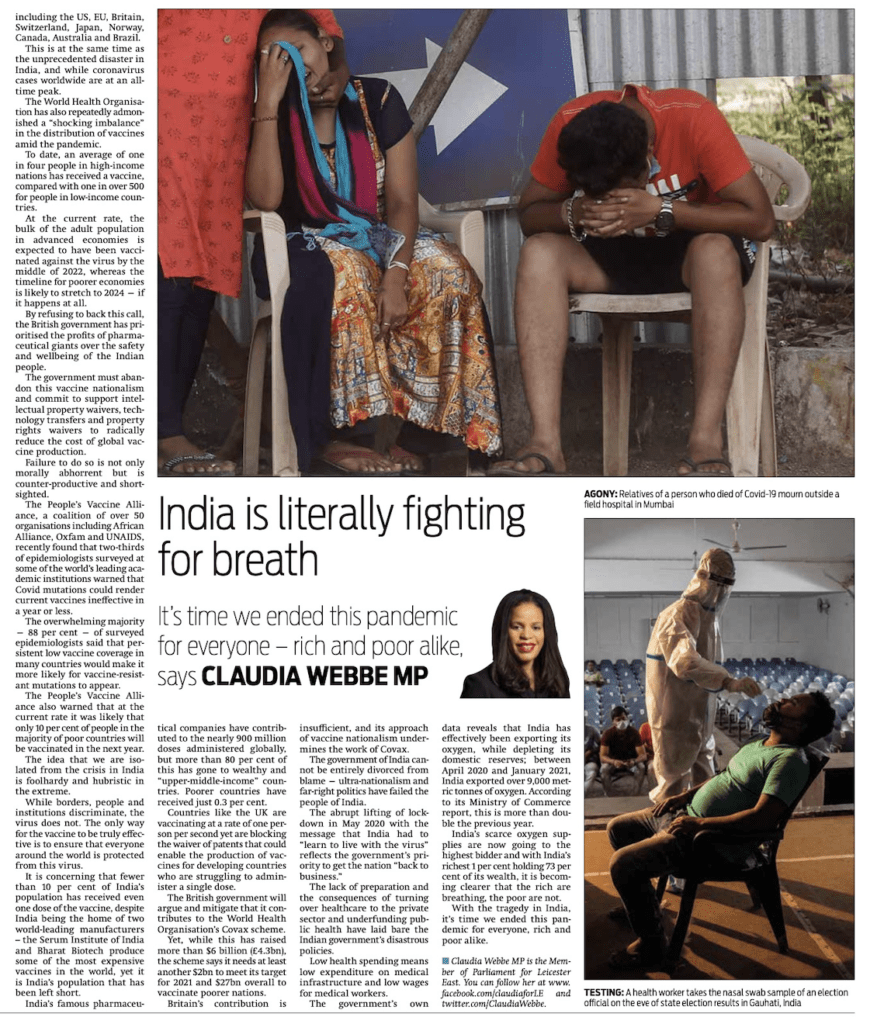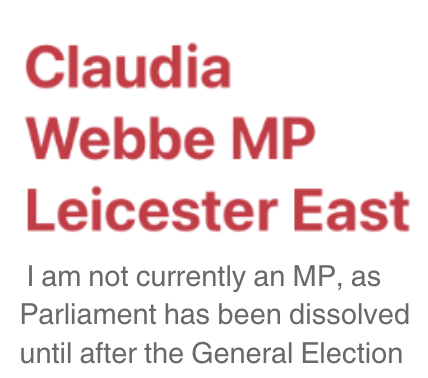
India is literally fighting for breath
By Claudia Webbe MP
It’s time we ended this pandemic for everyone – rich and poor alike says CLAUDIA WEBBE MP
WHILE we in Britain can be thankful that, due to the exceptional work of our NHS, Covid-19 cases are relatively low and lockdown measures are relaxing, around the world the pandemic is at an all-time peak.
Perhaps most concerning is India, which is suffering an exponential increase in Covid-19 cases, with over 300,000 new infections recorded each day.
In February 2021 the average number of new cases in India was 11,000, rising to an average of 22,000 new cases until this recent sharp rise.
Hospitals are being overrun, while oxygen and other life-saving medical equipment is in short supply.
The scenes of people dying outside hospitals have been absolutely harrowing.
On Wednesday, India surpassed 200,000 deaths from the virus, although the actual count is believed to be much higher.
As my constituency of Leicester East has one of the largest Indian communities in the country, this has been especially distressing for many whose loved ones are affected by this disaster.
There is also deep concern for Indian nationals stranded in Leicester and around Britain, and particularly those who make up the Indian overseas student community.
A senior Indian health official described the international support received so far as “a drop in the ocean.”
I have urged the British government to increase the number of surplus therapeutic drugs, oxygen and vaccines to India.
I also encouraged the government to share British expertise in areas like genome sequencing and epidemiology to map and track the spread of the virus — and to play a leading diplomatic role in helping to co-ordinate the international response to this crisis.
What makes the crisis in India even more alarming is that India was amongst the first countries to call — back in October 2020 — for intellectual property rights to be suspended to ensure that all nations, not only the richest, can produce vaccines at a much cheaper and quicker rate.
The landmark proposal, which was jointly submitted by India and South Africa, has been backed by more than 100 mostly developing countries.
The waiver, if adopted at the WTO’s general council, could help countries around the world overcome legal barriers preventing them from producing their own coronavirus vaccines and treatments.
While this is not a silver bullet, removing barriers toward the development, production and approval of vaccines is vital in the fight to prevent, treat and contain the coronavirus.
Yet six months on, the life-saving proposition continues to be stonewalled by a small number of wealthy governments — including the US, EU, Britain, Switzerland, Japan, Norway, Canada, Australia and Brazil.
This is at the same time as the unprecedented disaster in India, and while coronavirus cases worldwide are at an all-time peak.
The World Health Organisation has also repeatedly admonished a “shocking imbalance” in the distribution of vaccines amid the pandemic.
To date, an average of one in four people in high-income nations has received a vaccine, compared with one in over 500 for people in low-income countries.
At the current rate, the bulk of the adult population in advanced economies is expected to have been vaccinated against the virus by the middle of 2022, whereas the timeline for poorer economies is likely to stretch to 2024 — if it happens at all.
By refusing to back this call, the British government has prioritised the profits of pharmaceutical giants over the safety and wellbeing of the Indian people.
The government must abandon this vaccine nationalism and commit to support intellectual property waivers, technology transfers and property rights waivers to radically reduce the cost of global vaccine production.
Failure to do so is not only morally abhorrent but is counter-productive and short-sighted.
The People’s Vaccine Alliance, a coalition of over 50 organisations including African Alliance, Oxfam and UNAIDS, recently found that two-thirds of epidemiologists surveyed at some of the world’s leading academic institutions warned that Covid mutations could render current vaccines ineffective in a year or less.
The overwhelming majority — 88 per cent — of surveyed epidemiologists said that persistent low vaccine coverage in many countries would make it more likely for vaccine-resistant mutations to appear.
The People’s Vaccine Alliance also warned that at the current rate it was likely that only 10 per cent of people in the majority of poor countries will be vaccinated in the next year.
The idea that we are isolated from the crisis in India is foolhardy and hubristic in the extreme.
While borders, people and institutions discriminate, the virus does not. The only way for the vaccine to be truly effective is to ensure that everyone around the world is protected from this virus.
It is concerning that fewer than 10 per cent of India’s population has received even one dose of the vaccine, despite India being the home of two world-leading manufacturers – the Serum Institute of India and Bharat Biotech produce some of the most expensive vaccines in the world, yet it is India’s population that has been left short.
India’s famous pharmaceutical companies have contributed to the nearly 900 million doses administered globally, but more than 80 per cent of this has gone to wealthy and “upper-middle-income” countries. Poorer countries have received just 0.3 per cent.
Countries like the UK are vaccinating at a rate of one person per second yet are blocking the waiver of patents that could enable the production of vaccines for developing countries who are struggling to administer a single dose.
The British government will argue and mitigate that it contributes to the World Health Organisation’s Covax scheme.
Yet, while this has raised more than $6 billion (£4.3bn), the scheme says it needs at least another $2bn to meet its target for 2021 and $27bn overall to vaccinate poorer nations.
Britain’s contribution is insufficient, and its approach of vaccine nationalism undermines the work of Covax.
The government of India cannot be entirely divorced from blame — ultra-nationalism and far-right politics have failed the people of India.
The abrupt lifting of lockdown in May 2020 with the message that India had to “learn to live with the virus” reflects the government’s priority to get the nation “back to business.”
The lack of preparation and the consequences of turning over healthcare to the private sector and underfunding public health have laid bare the Indian government’s disastrous policies.
Low health spending means low expenditure on medical infrastructure and low wages for medical workers.
The government’s own data reveals that India has effectively been exporting its oxygen, while depleting its domestic reserves; between April 2020 and January 2021, India exported over 9,000 metric tonnes of oxygen. According to its Ministry of Commerce report, this is more than double the previous year.
India’s scarce oxygen supplies are now going to the highest bidder and with India’s richest 1 per cent holding 73 per cent of its wealth, it is becoming clearer that the rich are breathing, the poor are not.
With the tragedy in India, it’s time we ended this pandemic for everyone, rich and poor alike.
Claudia Webbe MP is the member of Parliament for Leicester East. You can follow her at www.facebook.com/claudiaforLE and twitter.com/ClaudiaWebbe


